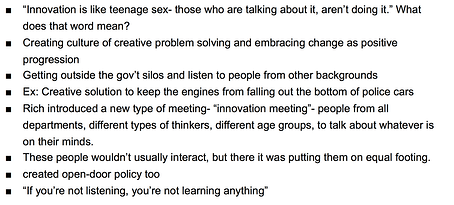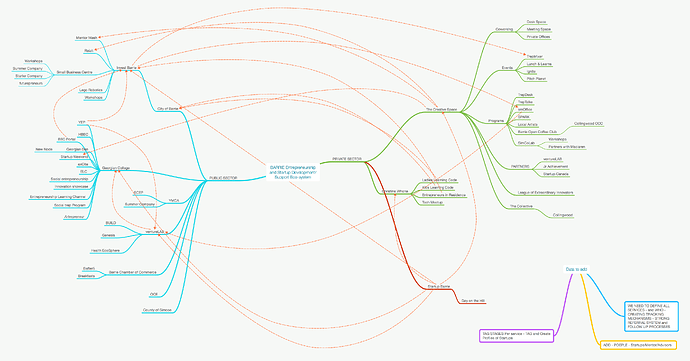I’m mostly in agreement with Tony on this philosophically, and especially agree with your takeaway here:
I can definitely see a common theme of “get past talking about coworking and tell me what the real value is”. And when we do that, when we talk about the support of the new workforce (although in different words) success happens.
On that theme, I had a great conversation with Trevor Twining (also here on the group) that might be relevant to your interests, especially the examples we covered about how independent economies are orders of magnitude more resilient than normal biz attraction/funding models.
Last month we had the former managing director for the City of Philadelphia speak at our conference about what he had learned from us during his time in office. Now that he’s on the private sector side, we got some REALLY candid perspectives that we never would’ve gotten from someone elected or appointed.
One of the biggest takeaways from that (as is evidenced in some of my notes from the event screen-shotted above) is that the best opportunity for gov’t and coworking spaces to work together is for gov’t leaders to learn a thing or two about how collaboration actually works from the spaces in their own municipality. Our former managing director worked with us to learn how our community members actually come together, and found ways to introduce elements of our culture within projects and departments at City Hall.
On a more tactical level, I’ve learned a few things about how to actually get things done with local gov’t folks.
-
Don’t mistake quickness to plan a meeting with quickness to act.
-
Insist on keeping things small - small is NOT in their wheelhouse, be prepared for this. But small wins, big is DOA.
-
Focus on helping them deliver a small win.
-
Avoid talking about “what could be” and “what will be.” Do things together, and then talk about what you’ve done together.
-
Don’t forget to be yourself. That’s why they like you.
(More in-depth version of those 5 points here)
At the end of the day I think that success comes down to being honest about two things:
1 - you can give them more than they’ll ever be able to give you
2 - whatever you do together should not depend on them, but instead, improve with their incremental participation.
···
-Alex
The #1 mistake in community building is doing it by yourself.
Join the list: http://coworkingweekly.com
Listen to the podcast: http://dangerouslyawesome.com/podcast
On Tue, May 31, 2016 at 3:43 PM, Nicholas Vincent [email protected] wrote:
Thanks Tony, I think you’re definitely on the right track.
When I look critically at where we are I can see we have one foot on each side of the fence you describe… Looking at previous conversations and agreements with various organizations (Small Business BC, Futurprenuer, the City of Penticton etc) I can definitely see a common theme of “get past talking about coworking and tell me what the real value is”. And when we do that, when we talk about the support of the new workforce (although in different words) success happens.
This is a very timely kick in the right direction, thank you.
And it’s wonderfully typical of this community too that you should be the one who chimes in with good advice at this stage in our growth, since it was you that Jen and I visited three years ago, green as could be shortly after we opened. You had great advice then too I’m sure 
Cheers,
Nicholas
On Monday, 30 May 2016 20:14:12 UTC-7, Tony Bacigalupo wrote:
I think the trick is to shift from thinking of yourself as a coworking space and towards thinking of yourself as an organization that supports members of the new workforce in a variety of ways.
A lot of otherwise terrific and passionate organizers are being held back by the illusion that they’re in the business of managing space. It’s something I’m working to shift with my clients and friends.
Look at the difference between mentalities:
Coworking space
- Success metric: Get enough members to cover costs and turn a profit. Then maintain status quo. Then fall into a rut. Then struggle. (Can you tell I’m not a fan?)
- Alignment with government and any other entities: Minimal
Organization to support the new workforce
- Success metric: Number of people thriving working for themselves and building businesses
- Alignment with government and other entities: Total!
If you think of the coworking space as the home base of an operation that has a mission that transcends the facility, you’re on a track that I expect would be easier to garner more substantial collaboration from government and various other organizations.
People can be members of that without needing to rent space. Your community can live in places, online and offline, other than the facilities you manage.
You’re diversified, less exposed to landlords, and always focused on the mission.
And you can avoid the coworking rut 
Am I on the right track?
Tony
—
New Work Cities - Helping people build better coworking cultures.
Open Coworking - Championing the global coworking movement.
Latest projects: Impact Coworking Program and the Ultimate Coworking Toolkit
New: Support the free resources of coworking.org for only $9/mo. Learn more!




On Mon, May 30, 2016 at 4:19 PM, Nicholas Vincent [email protected] wrote:
Hi All,
I run Cowork Penticton in BC, Canada and have a very solid relationship with our community and our municipal government. I’m looking at strengthening our ties with our Economic Development Office (EDO) and would like to know if anyone else has worked through a similar challenge as below:
- Our coworking facility is seen as a valuable community resource and amongst other things, we feature in the City’s marketing and new business attraction material. It’s a great relationship this way, however due to restrictions on municipal spending that is seen to benefit a for profit business that is really where the relationship ends. There are many acknowledged opportunities for working together, however I’m struggling to find a models that fits the red tape.
Am I potentially looking at this from the wrong angle?
Reading a post from Derek Neighbors back in 2011 on how a traditional coworking space may be viewed certainly rings true and I’d love to hear more viewpoints on structuring a sustainable working relationship with an EDO at a Municipal Government.
To be clear, I am not talking about asking for funding from our local government. I am looking to find a way to position coworking such that partnering with an EDO is financially beneficial and enhances their information and development value to the City, given the unique environment that coworking generates.
Cheers,
Nicholas
Co-Founder - Cowork Penticton
[email protected]
–
Visit this forum on the web at http://discuss.coworking.com
You received this message because you are subscribed to the Google Groups “Coworking” group.
To unsubscribe from this group and stop receiving emails from it, send an email to [email protected].
For more options, visit https://groups.google.com/d/optout.
–
Visit this forum on the web at http://discuss.coworking.com
You received this message because you are subscribed to the Google Groups “Coworking” group.
To unsubscribe from this group and stop receiving emails from it, send an email to [email protected].
For more options, visit https://groups.google.com/d/optout.


